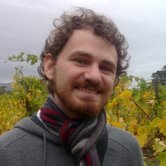 Nathan Curnow’s latest collection, The Ghost Poetry Project (Puncher & Wattmann), is based upon his stays at ten haunted sites around the country. He has featured widely on ABC and with further assistance from the Australia Council is writing a new play based upon convict stories and escape myths.
Nathan Curnow’s latest collection, The Ghost Poetry Project (Puncher & Wattmann), is based upon his stays at ten haunted sites around the country. He has featured widely on ABC and with further assistance from the Australia Council is writing a new play based upon convict stories and escape myths.
www.ncurnow.blogspot.com
Sails and Anvils
Travelling to Australia’s most ‘haunted’ house
Upon arrival I will be the working poet cocked
for inspiration, directing my hosts with a pen’s arrow
from the signs of my splitting headache. Inside
the plane the cabin of my head is rocked by
turbulence. Great sails and anvils are bright
arctic pages, the story of a doomed expedition.
This is the lesson—do not stay with poets
the night before flying out, drinking ensues
and they just want to have sex or complain
about their rejections. I left them moaning,
friends of mine, making love like friends,
bearing all but their vocabularies, competing
in wild noises. Aren’t we all falling, our egos
packed with a plastic whistle to draw attention?
If the plane lands safely there is a rental car
waiting, some compartment I can crash in.
Another brittle booth, certain to betray me
when the impact finally comes. I am cranky
this morning, hurtling toward the chapter of
my decline. But with a pen and a pose I go
to work as if spirited by questions of ‘soul’.
I just want to get off. Go, get fucked.
We are turning into cloud.
Love Note On Serviette
Inspired by an account of the ‘prisoner’ who in 1899 threw a love poem
weighted by a stone over the wall of the Fremantle Lunatic Asylum.
my own fond love
this portion find your path
I feel myself beyond myself
am able to choose this rock
to traffic these words
put your cold on me
gazing forever upward
throw me something
I love you I love you
lavender is making sense
notice the rocks
I have practiced this
promise me yourself
I found a secret passage
beneath the Peppercorn trees
it is forbidden by the Pope
instead he blessed me
with a hole in the wall
I have imagined
that you wave
much like you throw
throw me something
be my gracious garden
your voice climbs over
a lavender ladder
do you want to
hear me breathing
I am feeling myself
the stiff sin of a sinner
the Pope is always watching
The Frame Around Us
Following my night in a ‘haunted’ hearse
again my weight on the edge of your bed,
words fall like empty shells, your ticking clock is
Pinocchio’s face, hands point to always speak the truth
my up-late brainteaser, I beg you to tell me
but your body is a ruthless mime, signalling all
that you refuse to say, scared the words will turn to flesh
a shrug of your shoulders, you are locked,
it is late, I am so tired of this coming and going,
one day I will tell you of this grand adventure, what it did
and did not achieve, these long road-trips,
a night in a hearse cocooned in my sleeping bag,
I saw shadows spill over the ceiling’s canvas, slide off
above my head, slowly at first, each one fell
the way I have become my poems, retreated to
my cluttered desk, I am disappointing to meet in person
stranded by language, designed for answers,
neat squares on a page of black, filling the boxes
with crude solutions, revising, we are grubby crosswords
down and across, the hands of your clock
trim away the night, as if time decides the rules
of the puzzle, keeps changing the frame around us
just lie down, we are safe for now,
it takes more than courage and words, waiting
to tell you of all I have seen, tonight I will not budge
(These poems are published in The Ghost Poetry Project, Puncher and Wattmann, 2009) http://www.puncherandwattmann.com/pwghost.html


 Kirk Marshall is the Brisbane-born(e), Melbourne-based author of “A Solution to Economic Depression in Little Tokyo, 1953”, a 2007 Aurealis Award-nominated full-colour illustrated graphic novelette. He holds a Bachelor of Creative Industries (Creative Writing), with Distinction from the Queensland University of Technology, and a first-class Honours degree in Professional Writing from Deakin University. He has written for more than fifty publications, both in Australia and overseas, including “Going Down Swinging”, “Voiceworks”, “Word Riot” (U.S.A.) and “3:AM Magazine”. As of 2009, he is the editor of “Red Leaves”, Australia’s first (and only) English-language / Japanese bi-lingual literary journal (
Kirk Marshall is the Brisbane-born(e), Melbourne-based author of “A Solution to Economic Depression in Little Tokyo, 1953”, a 2007 Aurealis Award-nominated full-colour illustrated graphic novelette. He holds a Bachelor of Creative Industries (Creative Writing), with Distinction from the Queensland University of Technology, and a first-class Honours degree in Professional Writing from Deakin University. He has written for more than fifty publications, both in Australia and overseas, including “Going Down Swinging”, “Voiceworks”, “Word Riot” (U.S.A.) and “3:AM Magazine”. As of 2009, he is the editor of “Red Leaves”, Australia’s first (and only) English-language / Japanese bi-lingual literary journal ((1).jpg)


.jpg)

